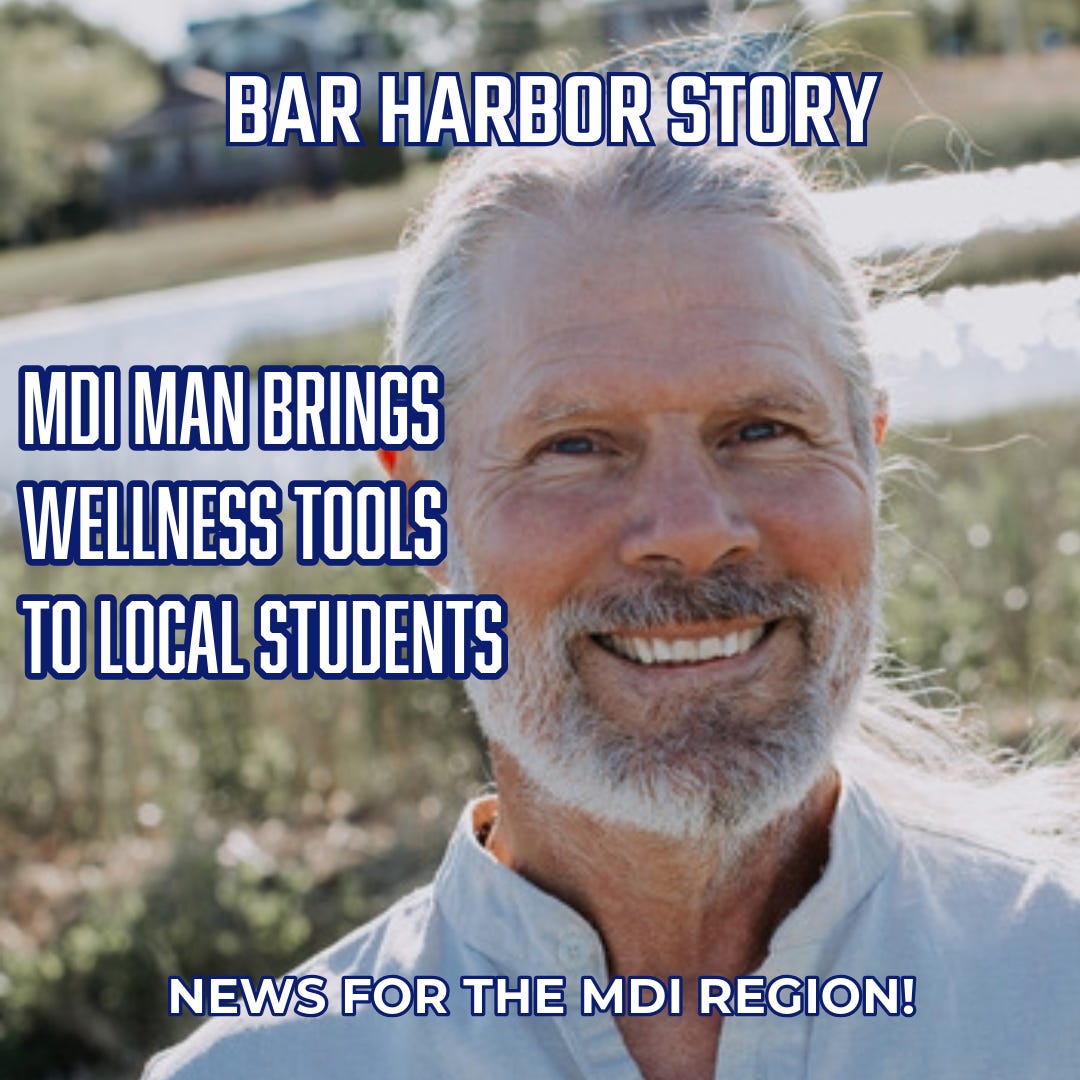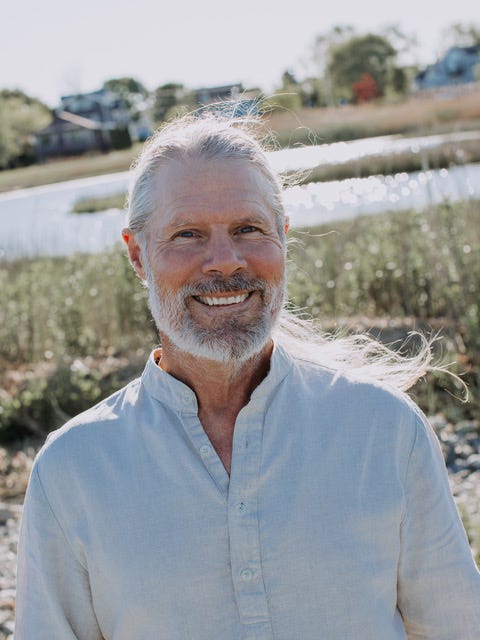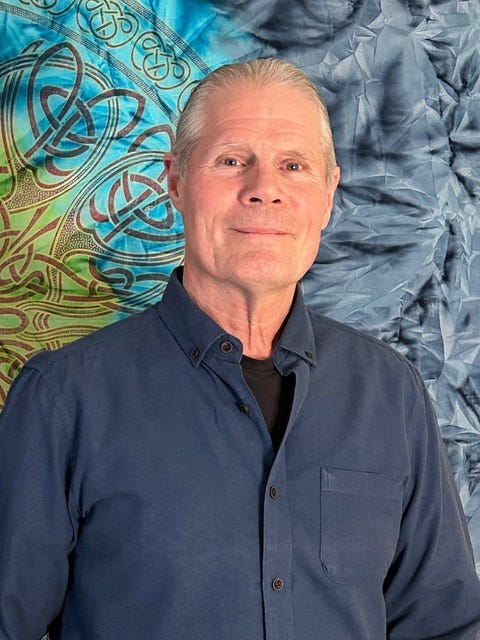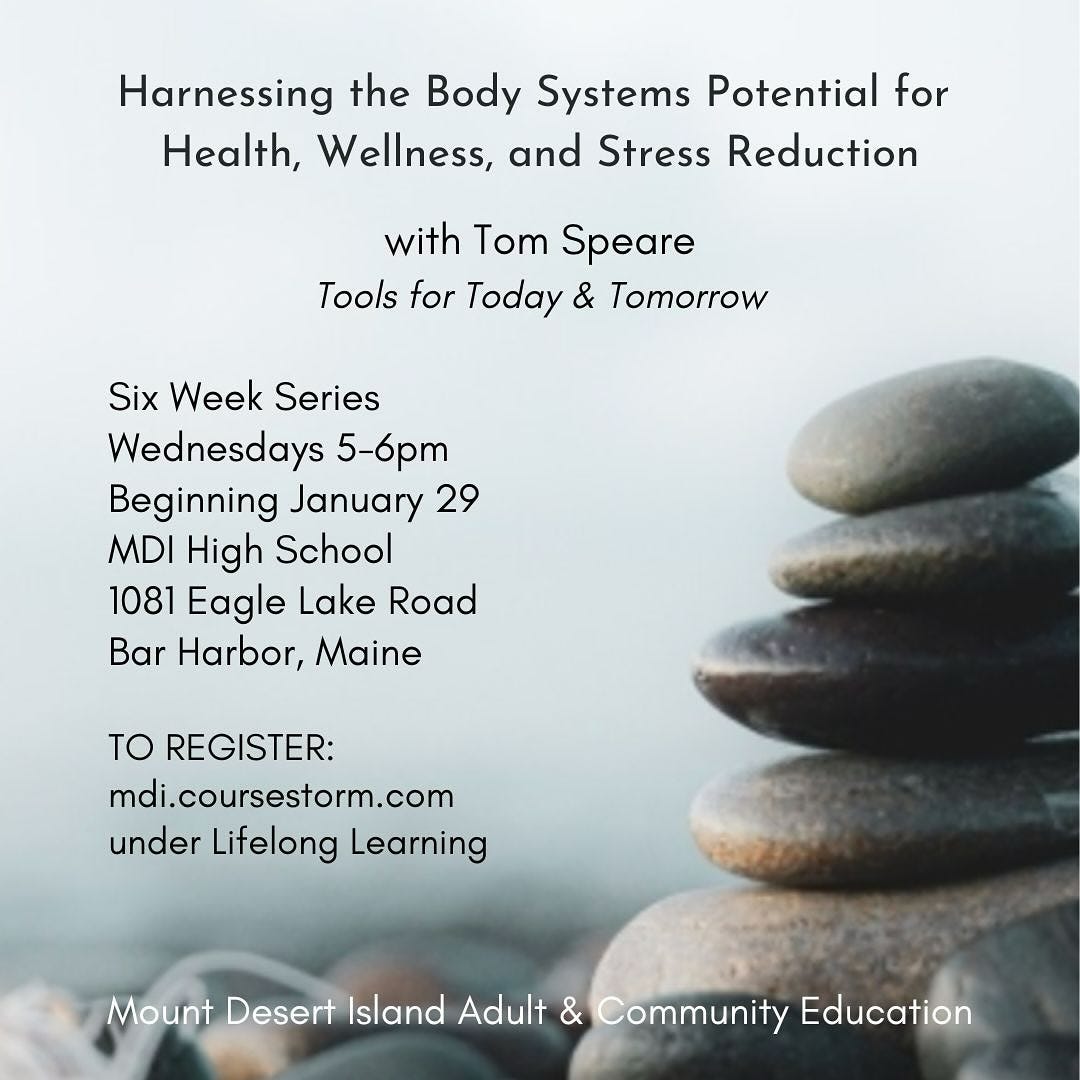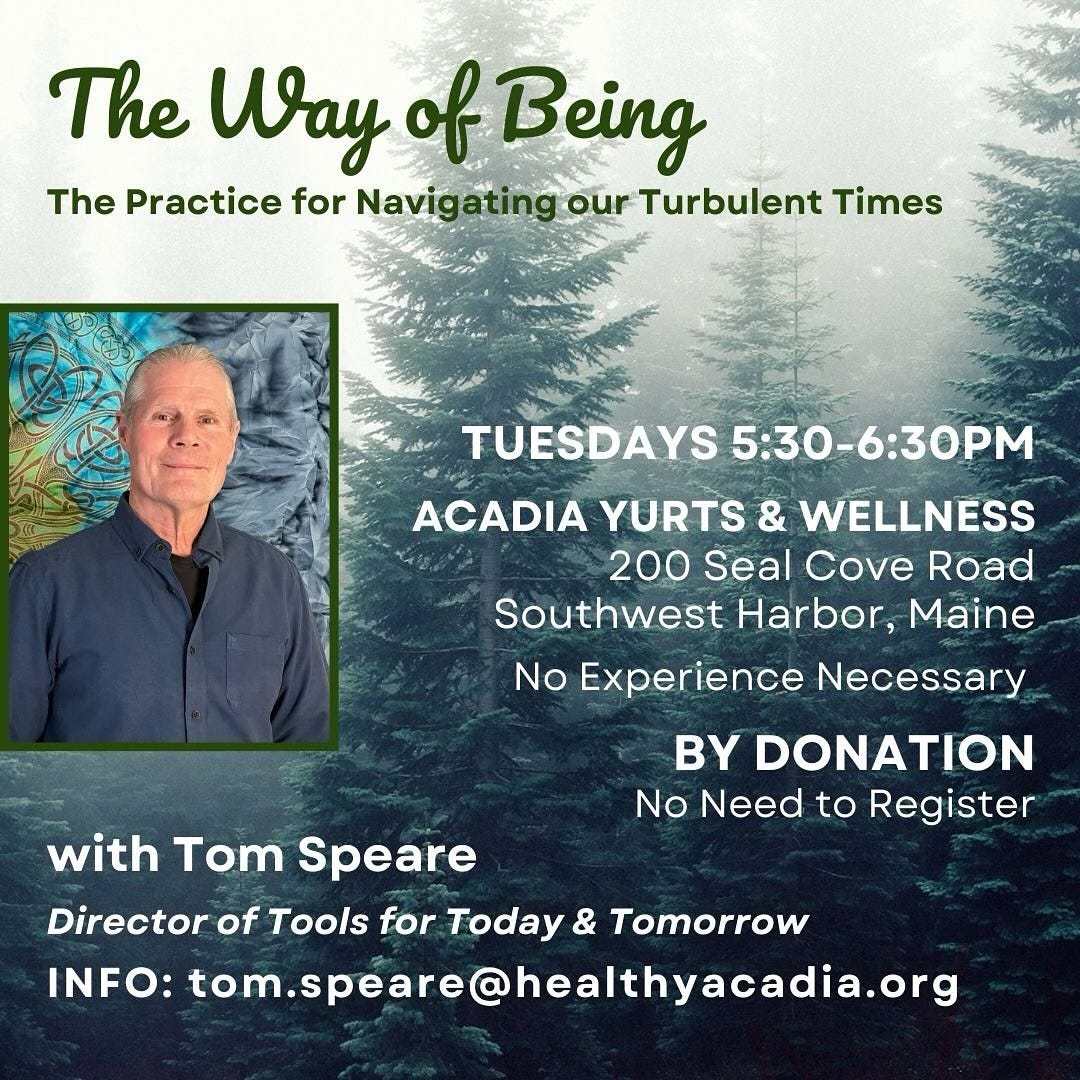MDI Man Brings Wellness Tools to Local Students
Harnessing body systems' potential for turbulent times
MOUNT DESERT ISLAND—Tom Speare has a mission that’s complicated and simple all at once. He’s devoted his life to making the world a better place one person in time. That happens when he gives students and adults the tools to help self-regulate and keep in balance in a world that sometimes feels like it leans toward balance’s opposite.
Multi-tasking. Those competing inputs for people’s time and attention. Doom scrolling. The dopamine hits from someone liking a post, a comment, a reel. It’s a “virtual tsunami wave” of attention grabbers.
“What are the consequences? The consequences are not good,” Speare said.
Those habits and inputs aren’t that positive for a person’s brain or their concentration or their anxiety levels, he says.
On January 21, Mount Desert Island High School Principal Matt Haney sent out an email reminding families of the school’s cell phone policies. Within the email is a video by Dr. Jonathan Haidt who wrote, “The Anxious Generation: How the Great Rewiring of Childhood Is Causing an Epidemic of Mental Illness.”
It’s all connected: the anxiety, the multiple stimuli, the stress, and people’s health.
“What does multitasking really mean? It’s just a hustle between a 1000 things,” Speare said.
The Cleveland Clinic and others link chronic stress to negative health outcomes such as vulnerability to chronic diseases, inflammation of organs and tissue, tension headaches, gut pain, and impacts on the nervous system.
There can be incredible anxiety and medical complications from stress, Speare said, and that puts students coming into this world at a disadvantage.
Speare, a calm-speaking man with clear eyes and relaxed, upright posture, doesn’t want that to happen. So, he’s doing something about it—hoping to give those students the tools to help them self-regulate. He’s in his second year working with the MDI schools and this year his tools program will be in three schools: MDI High School, MDES, and Trenton Elementary.
Three schools, though? It isn’t enough for him either.
“I am looking to build the ‘Tools’ program to cover more schools, and am looking to find some folks to join my team,” he said.
The program is funded from donations and grants, Healthy Acadia is Speare’s fiscal sponsor. This allows him to apply for grants that are only awarded to nonprofit organizations.
“The relationship with Healthy Acadia is superb, and they really support what I’m doing,” he said.
According to the website of Speare and his wife, Reinette Fournier, “The vision for the Tools program is to develop a team to provide greater programming capabilities and reach further across our area schools. It is abundantly clear that the levels of stress and anxiety are increasing every year, and reducing those levels is critically important for mental health, stability, and success. To grow the program in that direction will require much greater fundraising results. We are beginning that effort already and are grateful for any support you can provide to the Tools program.”
“The value in this program is multi-faceted. The physical, emotional and mental benefits are measurable and undeniable. Not only does one learn strategies for approaching, navigating and recovering from stress, one also learns to raise self-care nearer to the top of the list of priorities. That alone, is the best thing one can do for oneself,” said Mount Desert Elementary School Principal Heather Dorr.
Since Speare and Fournier moved to Mount Desert Island in February of 2022, they’ve been building the tool kits of others as well as their own business, Tenth Gate Yoga Center. They moved from Rhode Island, where they’d lived for four decades, but Speare has been up on MDI for most of his life, first in summers, then full-time when he was at University of Maine, then vacation for 45 years.
“I’m in this community because I love it up here, and I really want to be able to reach as many people as I can to share what I’ve learned about how to live in this world,” he said.
He doesn’t just work with students. He also holds a community class at Acadia Yurts and at the MDI Adult Education Center. Those are avenues, he says, for him to reach the island community in different settings, but still be able to focus on helping people learn how to self-regulate and keep more in balance.
His passion has developed his yoga business and practice and engagement.
“My practice that I’m offering is what I’ve learned. I’ve learned basically how our bodies work. The science is so available, so everyone can find out very deep information about the body,” he said.
Those tools toward self-regulation aren’t taught in many ways in our society—if at all. Instead, we learn, he said to be tough, to work through it. Be strong. Be resilient. Just push through to the other side. You have to do everything well.
How you do change that mindset?
Sometimes, you can change it, he believes, when someone comes along and says, “Wait a second. Here’s how to help yourself.”
During the supervised class visits, he’ll ask the groups of second, fifth, and seventh graders if they feel stress in their bodies and if so, to raise their hands.
“Hands go flying up. What’s really deeply disturbing about that is the percentage of people who can’t get any sleep,” he said.
That’s especially worrisome for kids.
“Kids are on their phones right up to the second they go to sleep. They are taking in intense stimulation. It happens day after day after week after month,” he said.
Seeing that condition now makes him more adamant that he needs to help by showing people the simple things that they can do to quickly change from being super stressed, super agitated, super wired, super anxious.
“Light bulbs go off,” he said.
But the issue is for those same people to incorporate those tools—to leave that agitated state—into who they are. To do that, that incorporation has to happen a lot. Forty days of repetitive practice to incorporate it enough to remember, he said. Longer is even better to help people catch the state of stress, and create a new subconscious pattern.
He said that 90% of what people do every day is driven by their subconscious minds. The patterns drive your life so if you want to change things, you want to improve things, you want to not live in a high-anxious state of chaos and worse, you have to try to create a new pattern.
The problem is that the subconscious mind resists.
“This is the part that’s hard. The kids can understand if they are a mess, but to do anything about it is the hard part. You have to give them time to get that new practice hammered in enough that it sticks,” he said.
Those tools might be visualization, breath work, or manifestations.
"There’s not one way to make a difference. One of the biggest components of what I do is breath work. I think that’s the most effective tool that I have. We all breathe,” he said.
There is science to back him up; cognitive neuroscientists in the last two decades have increasingly focused on the links between breathing and anxiety, visualization and stress. The practice has been around for thousands of years.
There’s another element of breath work though—it’s empowering.
“You show them what they can do to change things. You put the power right in them immediately,” he said.
One teacher whose students he worked with sent out a survey to those same kids.
“One of the best responses was that Tom should be brought in before tests and sports events because it makes such a difference,” he said.
That’s the goal: making a positive difference.
“This practice helps with these situations: that’s the goal—to get people to get that connection about how they can manage their life,” he said. “I’ve got a job for the next 150. The need is there. The need is way, way bigger than I can ever address. If you have wisdom, if you have knowledge, it’s really yours to share, it’s yours to distribute to wherever you can. Your role is to serve the need of others.”
LINKS TO LEARN MORE
Simon Sinek discusses the adolescent brain and the addictive properties of cell phones and social media.
Dr. Jonathan Haidt, author of The Anxious Generation: How the Great Rewiring of Childhood Is Causing an Epidemic of Mental Illness.
What stress can do to your body from the Cleveland Health Clinic
Tom’s website . . . www.tenthgateyogacenter.com
If you’d like to donate to help support us, you can, but no pressure! Just click here (about how you can give) or here (a direct link), which is the same as the button below.
If you’d like to sponsor the Bar Harbor Story, you can! Learn more here.





